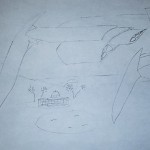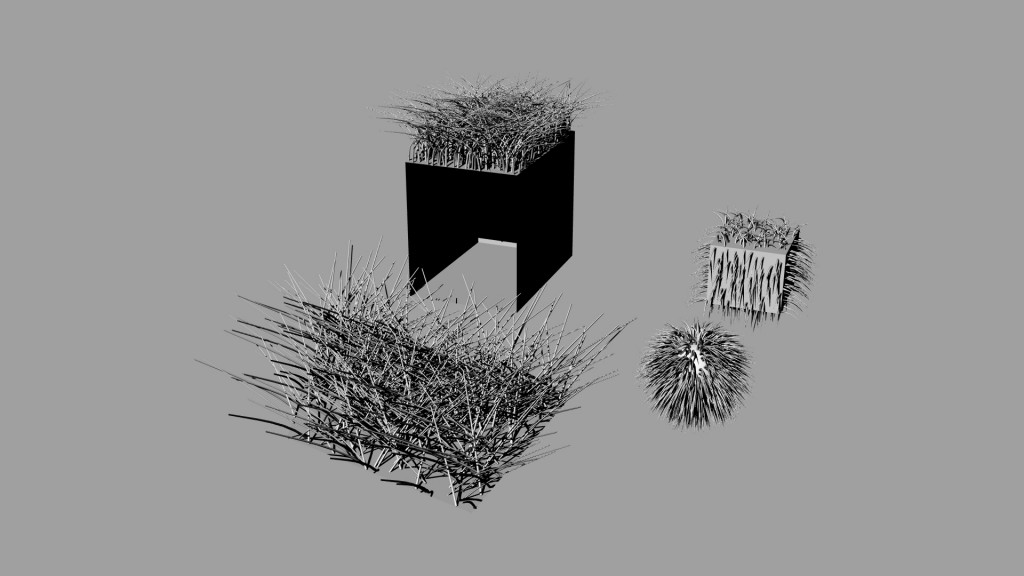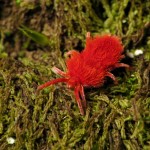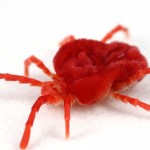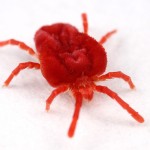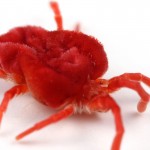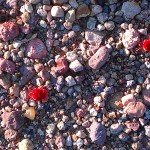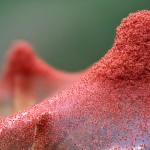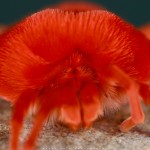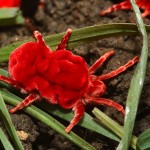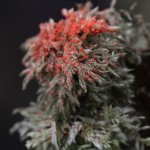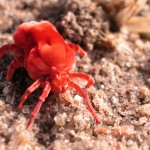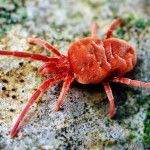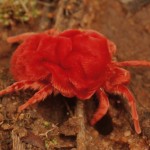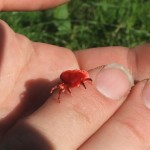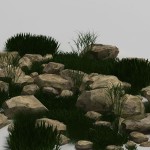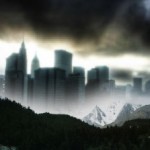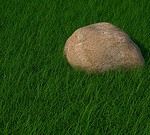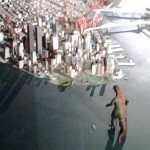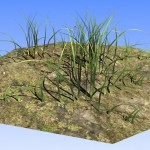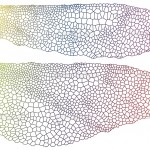Author: nmh009
In-progress renders
Project 3 running updates
Project 3 sketches
Project 2 sketches
Test Renders
Pr. 3, Step 4
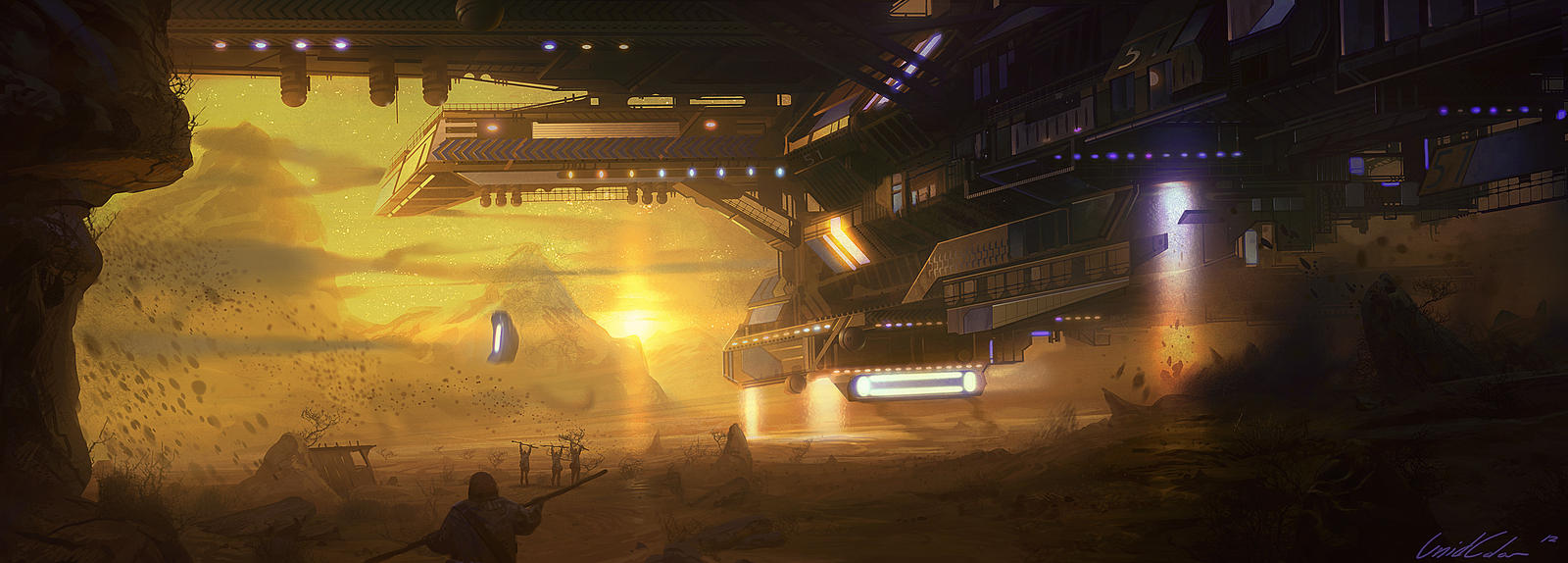
Spaceship by UnidColor from here. Above image is skewed.
I very much like the way this image is constructed. The perspective relative to the spaceship is exactly what I had in mind.
Pr. 3, Step 3
Pr. 3, Steps 1, 2
Topic: What if we found aliens?
2. Consider and clarify your topic
My question is “what if we found aliens?” This is an important question to me and for many people. In fact, I believe that there is one of the most important questions. Many people are too fickle to seriously contemplate the thought. The “real world” that we live in is so full of distractions that few people truly care about such things. Staring up at the stars was the pastime of our ancestors (and may have been the foundation of the first religions—a controversial idea), and they wondered the same kinds of things. What is we found aliens? How would society change? How long would it take humanity to build up its defenses or tear them down, as necessary? We could find aliens or we could be found by them. We could sense their existence with our precise instruments or we could one day find them among us. We might find aliens on Mars in the form of fossilized algae or crashed spacecraft from hundreds of millions of years ago. Would aliens be like those in the movie Contact (the best kind), or the movies War of the Worlds or Independence Day (the worst kind)? If we found non-trivial aliens (e.g. plants on Venus aren’t as interesting as intelligent beings), it would change society forever. Economies, science, politics, religion, human fickleness—each would either completely collapse or be strengthened to unimaginable levels.
10 tangible, related things:
- Alien spaceship
- Earth
- Astronomy things, like telescopes
- Computers
- Astronauts
- President of the U.S. / U.S. government
- Area 51
- Enlightenment/accruement of knowledge
- War
- Explosions
Final Renders
Test renders
Running Progress
Testing RhinoHair for hair, grass
Click to install the RhinoHair plugin: RhinoHair (website)
Open the zip file. It’s probably in your Downloads folder. Extract the file to someplace you know where it is (Desktop).
Right click on the file > Properties > Unblock. This unblocks the file because it came from the internet, and Rhino doesn’t like blocked files.
Drag the file (rhinohair.rhp) into an open Rhino session. It should say “Drag and drop loaded plug-in to [file location]”.
Good job. The (only) command to use the plugin is “RhinoHair”.
For reference: 50,000 hairs, length=1, segments=3, sides=3, other settings=default; takes 65 minutes on the lab computers. The program goes through 3 iterations per hair, so 1,000 hairs requires 3,000 iterations. Every 1,000 iterations generally takes 20 seconds, so you can roughly calculate how long it takes to grow your own hairs.
Step 2. Story: Gulliver’s Travels
Gulliver’s Travels (by Jonathan Swift, 1735) is a story about a man (Gulliver), who travels the world and finds himself in mysterious places. Most prominently, he travels to a land of giants, a land of very tiny people, a floating island inhabited by scientists, and a land governed by logically-thinking and English-speaking horses. In each of these and other places, he is initially captured and then utilized in some way, such as for entertainment, military use, or simple conversation.
The major events in this story are Gulliver’s travels themselves. It is interesting and exciting to read the descriptions of the people and society of each civilization he encounters. It brings to life what many people might daydream about:for example, what would it be like to be a giant in a land of 2-inch tall people? Gulliver fully takes advantage of the environments he finds himself in; he impresses the “tiny people’s” royal court by dashing over mountains, which to Gulliver, is simply jogging around. The climax of the story occurs when Gulliver looks back on his ridiculous encounters and rejects human society and his home of England, for what he now sees as equally ridiculous, and chooses to live by himself with horses.
I plan to have three scenes: 1) a tiny spider mite clambering over a rock (as we normally see them), 2) a huge spider mite walking over or approaching a city, and 3) a winged spider mite flying into the sky. The first two will resemble Gulliver’s travels to small and giant lands, while the third will show the mite’s utter rejection of reality (not having wings) and flying away.
Step 3. Spider mite pictures
Step 1. Bug research – Red spider mite
I have chosen the red spider mite, also known as a velvet mite, or simply “red mite”. This arachnid hails from the order Trombidiformes, which includes the majority of known mites and similar species. The red spider mite is common in temperate climates across the globe, and comes in many shapes and sizes. In the US, these mites range in size from microscopic to the size of a fingernail. As its name implies, the mite is a deep red, and its body is entirely covered with short, dense hairs, giving it a fuzzy or velvety appearance. The body of the mite resembles a crumpled ball or a human brain. Most people in the US encounter red spider mites as tiny red specks scuttling over rocks in the summer. Much larger species live underground and hunt small insects. All species are parasitic to long-legged insects (such as spiders and grasshoppers) at some phase in their life cycle. Some species have their largest eyes mounted on stalks, which is uncommon for arachnids.
I specifically chose the red spider mite because I have always thought it was an interesting animal from when I was a kid, when I would squish all of the “red dots” with my finger. After seeing one under a microscope and learning more about them, spider mites are pretty interesting (and look cool, like a fuzzy brain). Spider mites are culturally linked to India, where they are used in rudimentary and alternative medicine for treatment of paralysis and inhibited sex drive. As such, these mites are also known as “Indian Viagra”. In India, they appear in great numbers before the monsoon season, and so are referred to as “rain mites”. And, perhaps unsurprisingly, the largest species are collected and eaten.
Nate Hill Summary
The primary inspiration for the vehicle in this project was a yacht. This particular type of boat was chosen because it was one of the vehicles least likely to be found in the Arctic, which is our chosen setting. The yacht was chosen specifically because it is a luxury craft whose purpose is to transport wealthy and important people in style. We designed this boat for James Bond, who would not travel in any watercraft less capable of conveying sleekness. James Bond’s usage of high technology was made evident by the futuristic controls used to control the yacht, as well as the fact the vehicle itself is a feat of engineering—it has legs! The legs were built to give the yacht the ability to walk up and over icebergs and glaciers, a common occurrence above the Arctic circle. Because Bond is famously suave and manly, we included a lush bed and relaxation area in the bridge of the yacht. Bond would also not travel to such a horrible place willingly—he must be there for a reason. This reason is the presence of a villain, made apparent by the scary-looking satellite dish shining a laser into the sky. The “story” presented in this project is that James Bond is traveling to the Artic to take down an enemy. To do so, he utilizes his climbing yacht. Afterwards, he relaxes in his luxury vehicle.
Nate Hill, Final Renders
Nate Hill, 20 renders
Nathan Hill
Your name: Nathan Hill
Your major: Mechanical Engineering
Please list a few of your interests, sports you play, or other activities you’re involved in (on or off campus).
I’m in the band, play video games, do lots of homework.
Why are you taking this class? What do you most want to get out of it?
I work with CAD all the time, and learning the organic side of using design software will benefit me in the future. Rendering photo-realistic images is also useful to my work and interesting.
Are there any particular topics or techniques that you’re hoping to learn about in this class?
I want to learn about creating organic shapes with specific dimensions if such a thing is possible, as well as have fun with a new program.
In your opinion, what makes a work of art interesting, worthwhile, or compelling—to put it simply, what makes a work of art good? Why do you feel this way?
A work of art is “good” if it is appealing to some sense of the body. Art can also be “good” if it can effectively convey an idea or feeling.
Email address: nmh009@bucknell.edu
Cell phone number: 570-954-1866
Cell phone service provider: Verizon

















